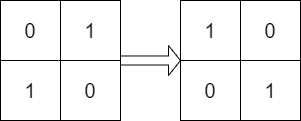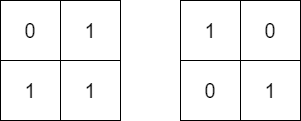Given two n x n binary matrices mat and target, return true if it is possible to make mat equal to target by rotating mat in 90-degree increments, or false otherwise.
Example 1:
Input: mat = [[0,1],[1,0]], target = [[1,0],[0,1]] Output: true Explanation: We can rotate mat 90 degrees clockwise to make mat equal target.
Example 2:
Input: mat = [[0,1],[1,1]], target = [[1,0],[0,1]] Output: false Explanation: It is impossible to make mat equal to target by rotating mat.
Example 3:
Input: mat = [[0,0,0],[0,1,0],[1,1,1]], target = [[1,1,1],[0,1,0],[0,0,0]] Output: true Explanation: We can rotate mat 90 degrees clockwise two times to make mat equal target.
Constraints:
n == mat.length == target.lengthn == mat[i].length == target[i].length1 <= n <= 10mat[i][j]andtarget[i][j]are either0or1.
class Solution:
def findRotation(self, mat: List[List[int]], target: List[List[int]]) -> bool:
def rotate(matrix):
n = len(matrix)
for i in range(n // 2):
for j in range(i, n - 1 - i):
t = matrix[i][j]
matrix[i][j] = matrix[n - j - 1][i]
matrix[n - j - 1][i] = matrix[n - i - 1][n - j - 1]
matrix[n - i - 1][n - j - 1] = matrix[j][n - i - 1]
matrix[j][n - i - 1] = t
for _ in range(4):
if mat == target:
return True
rotate(mat)
return Falseclass Solution {
public boolean findRotation(int[][] mat, int[][] target) {
int times = 4;
while (times-- > 0) {
if (equals(mat, target)) {
return true;
}
rotate(mat);
}
return false;
}
private void rotate(int[][] matrix) {
int n = matrix.length;
for (int i = 0; i < n / 2; ++i) {
for (int j = i; j < n - 1 - i; ++j) {
int t = matrix[i][j];
matrix[i][j] = matrix[n - j - 1][i];
matrix[n - j - 1][i] = matrix[n - i - 1][n - j - 1];
matrix[n - i - 1][n - j - 1] = matrix[j][n - i - 1];
matrix[j][n - i - 1] = t;
}
}
}
private boolean equals(int[][] nums1, int[][] nums2) {
int n = nums1.length;
for (int i = 0; i < n; ++i) {
for (int j = 0; j < n; ++j) {
if (nums1[i][j] != nums2[i][j]) {
return false;
}
}
}
return true;
}
}


